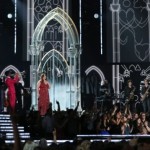Each week in God and Country Music, Nick Rynerson gives country music a chance and examines the world of Americana, folk, alt-country, and popular country music.
With the rise of legitimate Christian hip hop and the continual presence of mainstream CCM (that sounds like something of a cross between Eddie Veder and Kenny G) and even a thriving Christian hardcore scene, the Christian scene seems to have an alternative for almost every popular type of music. Well, almost every type. Somehow, the high and lonesome sound of country music has escaped reproduction within the evangelical church.
To understand why this is (and to understand why DC Talk never had a slide guitar player) let’s look at Country music itself. Mainstream Country music started fundamentally as a Christian effort, with church singers such as The Carter Family and other old white gospel groups singing about their heavenly home. And throughout country music there has always been a spiritual undercurrent. For example, No Depression, which is a nickname for the alt-country genre, comes from the title of an old Carter Family song “No Depression in Heaven” (covered, by the legendary Uncle Tupelo). And as country music progressed, divided and commercialized, that spiritual tune remained influential.
But as I covered a few weeks ago, Popular Country Music has become infested with a moralism that is rooted in nostalgic religion and patriotism. This slow drift into sinful tendencies is nothing that is uncommon to man (or man’s music). But country music is unique. When rock and rollers are in outright rebellion to authority and pop music is about getting really drunk really fast…
…country music is just about being good.
Essentially, in the parable of the prodigal son, Country music is the older brother while Rock, Rap and Pop are the prodigal son.
It is that prodigal son-style licentious sin that leads Christian musicians to carve their own path in a particular musical genre, scraping the rebellion but keeping the aesthetics. To those Christian artists credit, despite the quality of the art, they usually at least convey the gospel adequately. But where are the Christian’s in country music? Have they been lulled to sleep by the appeal of law and works-righteousness or do they still see the beauty and tradition of Nashville as a place that can be redeemed?
The answer is probably a bit of both. While many country artists use the genre and culture to talk about themes or redemption, God and gospel whether as homage to times past or out of sincere devotion. And yet, the Phariscetical tone to a lot of Country radio’s “God-talk” is hard to ignore. Rodney Atkins’ song “Watching You” about his son’s imitation of his habits is tell-tale of a safe, regulated Christianity that serves as nothing more than a salute to conservative culture and “country culture”. The song basically shouts “if you want to be a good father you need to hunt, wear cowboy boots, drive a truck and pray”.
And on the other side of the coin, Patty Griffin’s latest album Downtown Church was a collection of age-old hymns that have littered the Americana landscape for years and some new gospel tracks. While Griffin wouldn’t describe herself as an orthodox Christian, she has captured the heart of the gospel. Her rendition of “All Creatures of Our God and King” is soul moving. And how amazing that it received a warm welcome from the Country world!
Like everything that man gets their grubby hands on, Country music is broken. And it uniquely strangles the gospel in its lyrics unchallenged by “Christian culture” while at the same time allowing for some of the most beautiful and intimate expressions of faith. Is this not the story of our lives? Our self-righteousness can sedate us just enough not to take action, while slowly rotting our souls (and music), but in the same medium, there exists the potential for such beautiful redemption. There exists such a well of gospel to tap within the hallowed halls of Country music’s history; it’s a shame we settle for so much less. This is everything from the bible to Country music to television to church: don’t settle for Diet Christianity.











